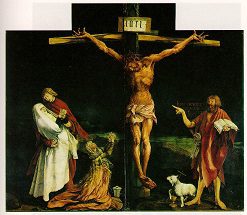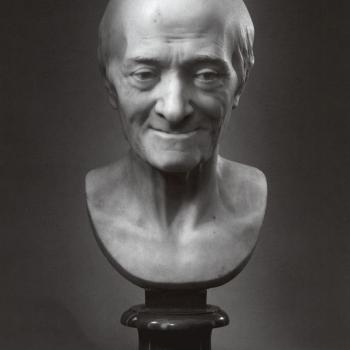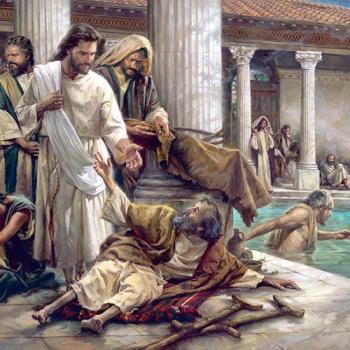Many Christmas Eves ago, Jeanne, our youngest son Justin, and I were invited to share dinner with a friend from work and her family, which included two precocious and very active children. On display was a beautiful crèche, surrounded by all sorts of interesting items—who knew, for instance, that there was a duck and an elephant (both roughly the same size as the baby) at the manger? My friend is from Italy; her mother annually sends new additions to the crèche scene from the homeland, often forgetting the comparative size of the items she sent in previous years. Our friend’s five-year-old daughter introduced Justin to the various characters in a monologue interrupted only by a few confirming comments.
And these are some shepherds, those are goats and sheep, that’s a dog a turkey and a cow, these are some angels, and that’s the baby Jesus.
Oh, really?
Yes. Actually, he died.
Yes he did, as Good Friday somberly reminds us. In some Christian traditions it is typical, anticipating the end of the story and what will happen in three days, to attempt a symbolic descent into the depths of pain and devastating disappointment. But there is no evidence that any person among Jesus’ family and followers expected that he would rise from the dead.
The crucifixion was an unmitigated disaster and they fled in fear for their lives. Some hid in anonymous locations to escape arrest. Some simply went home. The bravest among them planned to show respect for the dead body in traditional ways. Various hopes and dreams were shattered. As the travelers to Emmaus said, “We had hoped that it was He who was going to redeem Israel.” But actually, he died. End of story—time to move on.
The idea of a suffering and dying God is not new—there are many traditions older than Christianity that include myths and stories of a divinity suffering and dying for various reasons. But this story is so intimately personal, so representative of the crushed hopes and dreams, the inescapable pain and suffering, that are fundamentally part of the human experience. That’s what makes Good Friday so poignant and what made it so devastating for those who were there, those who had tied their lives to this man. He seemed to be something more but turned out to be the same as everyone else—human, limited, subject to suffocating power and injustice, to the random events that ultimately shape each of our stories. We had hoped—and he died.
In the religious tradition of my youth, Good Friday was a speed bump on the way to Easter. Our theology was what scholars call a “theology of glory,” one that emphasizes the power and glory of God as exemplified through Christ’s sacrifice for the sins of the world on Good Friday and his triumphant resurrection from the dead three days later. It is difficult to pay more than twenty-four hours of attention to the suffering and agony of the cross when you know that it all ends up in the right place.
Although I left many features of my conservative Protestant upbringing in my rear-view mirror decades ago, I did not start thinking differently about Good Friday and Easter until I encountered Simone Weil’s work for the first time over thirty years ago. Weil writes that “The death on the Cross is something more divine than the Resurrection,” and suggests that the heart of Christianity would be complete with the Crucifixion even without the Resurrection. What happens if the focus of one’s Christian faith is Good Friday rather than Easter?
The Crucifixion without anticipating the Resurrection first moves our attention away from glory, power, and triumph, instead focusing us on suffering, pain, and weakness. This in itself brings home the fundamental fact of Christian belief—God became human, with an emphasis on the human part.
This is something that a theology of glory tends to de-emphasize, at the risk of turning away from the most fundamental truths of the human experience. I once had a discussion with my after-church adult education seminar group about the end of the Book of Job in the Jewish scriptures, an ending that scholars say was tacked on long after the main story had been written in which after forty some chapters of suffering Job gets back everything that he had lost.
I asked the group why someone might have found it necessary to add this “happily ever after” ending to such a dark and human story. “Because the original ending is too tough,” someone suggested. “Because people want to believe that suffering has a point, that it is all for something,” another contributed. “Which makes the better story?” I asked. The original or the one with the new ending? “The original is truer,” an eighty-something regular participant who recently passed away said. “People don’t come back. Things that you lose don’t return.” And she was right. A theology that depends on a triumphant, happy ending is one that runs the risk of failing to address the human condition as we find it.
In contrast to a theology of glory, the God of a theology of the cross addresses the human condition, not by overcoming it, but by becoming part of it. The vast distance between the human and the divine is mediated by the divine becoming incarnated in flesh and thus becoming subject to everything that human beings are subject to—including suffering and death.
Incarnation and crucifixion are expressions of love; resurrection is an expression both of love and power. Simone Weil focuses on the Crucifixion rather than the Resurrection in order to counter our common tendency to rush ahead to the Resurrection, thus failing to recognize the depth of the agony and suffering required for Christ’s mediation. She does not deny the Resurrection; rather, she asks us not to let our joy at the risen Christ diminish our understanding of the price required for us to be made the friends of God.
After the Resurrection the infamous character of his ordeal was effaced by glory, and today, across twenty centuries of adoration, the degradation which is the very essence of the Passion is hardly felt by us . . . We no longer imagine the dying Christ as a common criminal.
The Incarnation and the Crucifixion focus our attention on unlimited love, something that we often are too quick to move past in our rush to a happy ending. But as Job tells us, “mortals die, and are laid low.” Good Friday reminds us that because of divine love the incarnated God did not seek to avoid this fundamental human experience.
St. Paul argued that the focal point of the Christian faith is the Resurrection: “If Christ be not raised, your faith is vain.” Simone Weil, however, asks us not to forget that, more foundationally, the Christian faith is vain if there is no Cross, no suffering and death of the divine mediator between God and humanity. Only when we see, as did the penitent thief, that the criminal hanging on a cross, rejected and despised by all, is the perfectly just God-human paying the ultimate sacrifice to achieve mediation between God and humanity will we begin to truly experience the mystery of the Christian faith.
If the story ended with Jesus executed as a criminal and dead in a tomb, we still would have reason to believe in a God of love. Our very existence, as well as the existence of the reality we inhabit, is evidence of God’s choice to create in order to love. The story of a God who becomes fully human, who lives a life in time subject to all things each human being is subject to, including suffering, pain, loss, tragedy, injustice, and death serves to drive the point deeper. Good Friday reveals just how far the divine chooses to go with us—into the depths of despair and death.
Jeanne and I once had a conversation about what the indispensable heart of Christianity might be. My contribution was that “God is love, and God is with us.” Stripped of millennia of doctrinal and dogmatic accretions, that’s what the Christian faith amounts to. And it is on full display on Good Friday with Jesus dying on the cross. I saw a poster recently with a dark twist on a familiar saying. “It is always darkest just before—it goes pitch black.” And God is there.

















